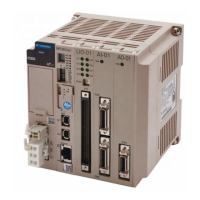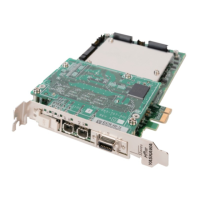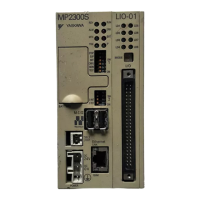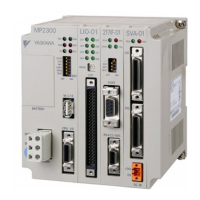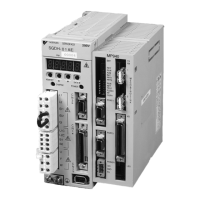2.10 Communications with a JTEKT PLC (TOYOPUC Protocol)
Using Automatic Reception with the MP3000 as a Slave
2-263
Communications Format
The MP3000 acts as a slave and receives data and returns a response to the master by using the communi-
cations formats for file memory commands that are shown below. Execution of the MSG-RCVE function
in the MP3000 ends when a response is returned.
Note: In the figure shown above, the Ethernet header, TCP/UDP header, FCS, and other items have been omitted. Only
the data portion of the communications format is shown.
File Memory and Corresponding Registers in the MP3000
The following table shows the relationship between registers in the MP3000 and the send data area of file
memory in the 2PORT-EFR.
Regardless of the connection number of the 2PORT-EFR, the MP3000 stores data from the first address
(MW00000) of the hold registers by default. To store the data in a specific hold register, use the automatic
reception offset setting.
* The automatic reception offset allows you to make any address between MW00000 and MW65534 the first address.
Transfer Size
The following table lists the data sizes that can be received in a single file memory command when using
automatic reception.
Data Range
2PORT-EFR Module
MP3000
Hold Register Data Area Addresses
File Memory Data
Area
File Memory Send/
Receive Data Area Addresses
Connection 1 1000: Data size, 1002 to 17FD: Send data
Storage area*: MW00000 to MW02043
Connection 2 2000: Data size, 2002 to 27FD: Send data
Connection 3 3000: Data size, 3002 to 37FD: Send data
Connection 4 4000: Data size, 4002 to 47FD: Send data
Connection 5 5000: Data size, 5002 to 57FD: Send data
Connection 6 6000: Data size, 6002 to 67FD: Send data
Connection 7 7000: Data size, 7002 to 77FD: Send data
Connection 8 8000: Data size, 8002 to 87FD: Send data
Applicable Model Data Size
MP3000
1 to 1,022 words
Specify the number of whole words.
E
0
(FT)
R
C
6
0
(FT)
0
0
L
L
L
H
Slave
MP3000
(local station)
Hold registers (M registers)
Send data
Command
Master
Response
File memory
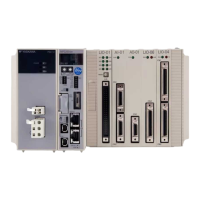
